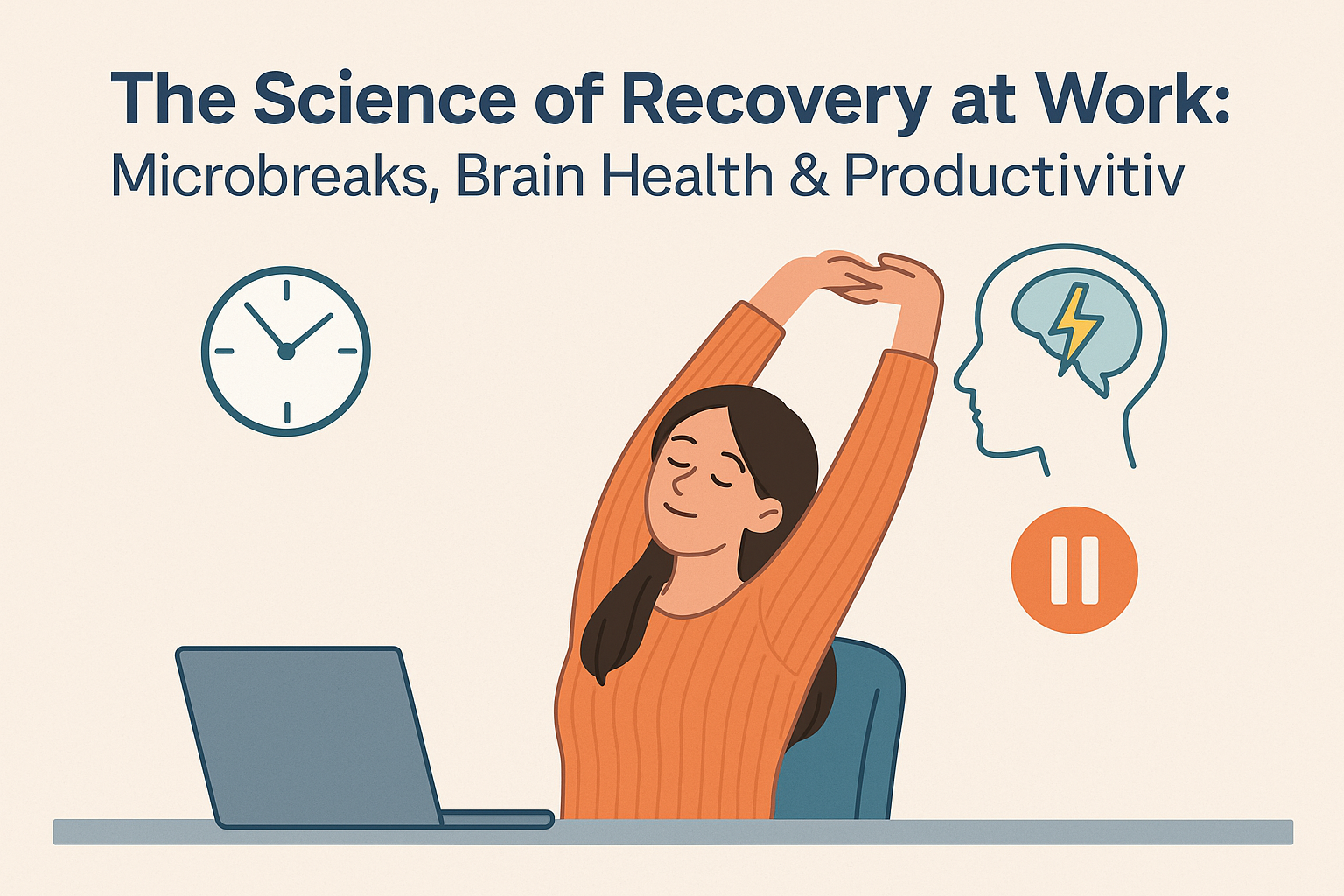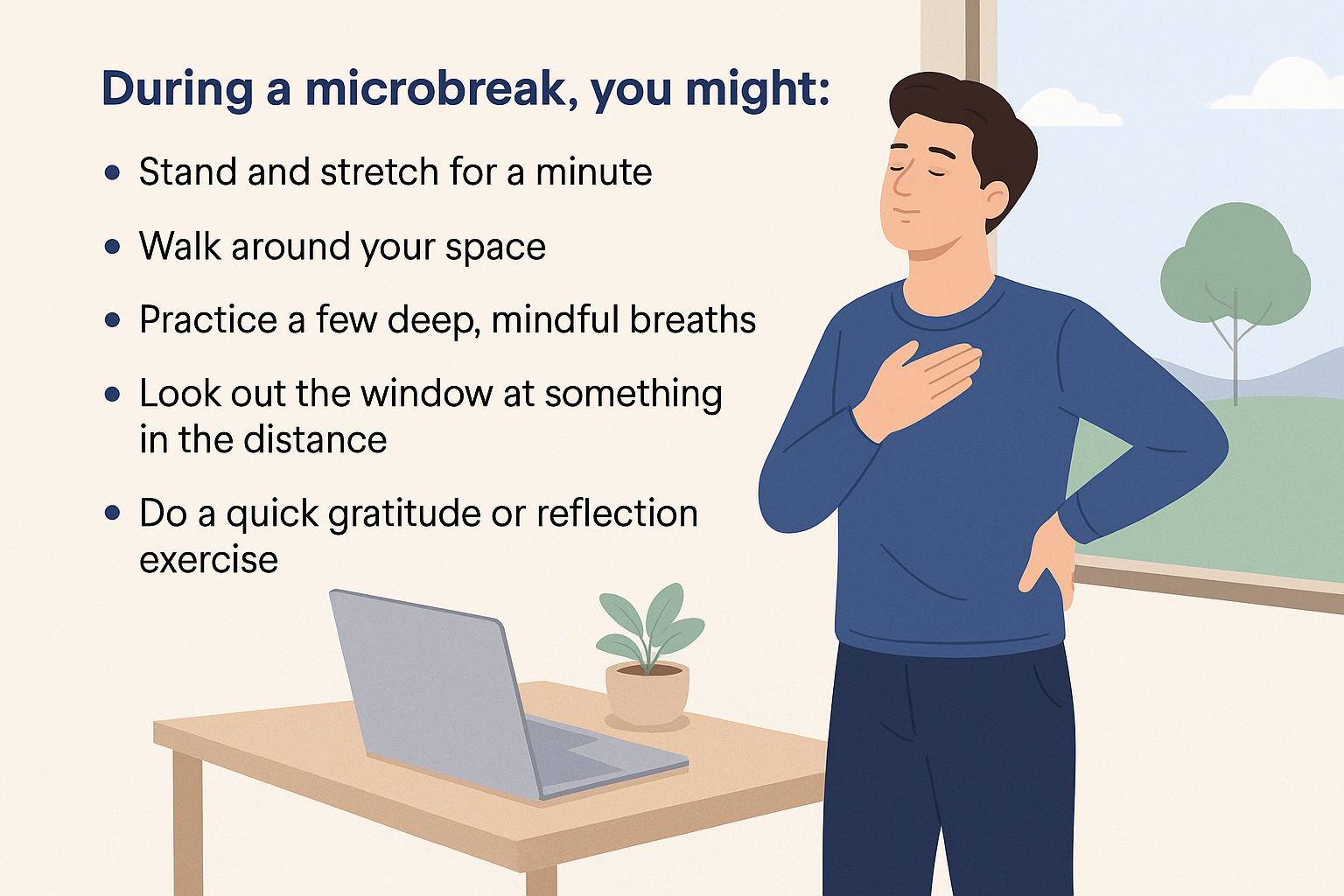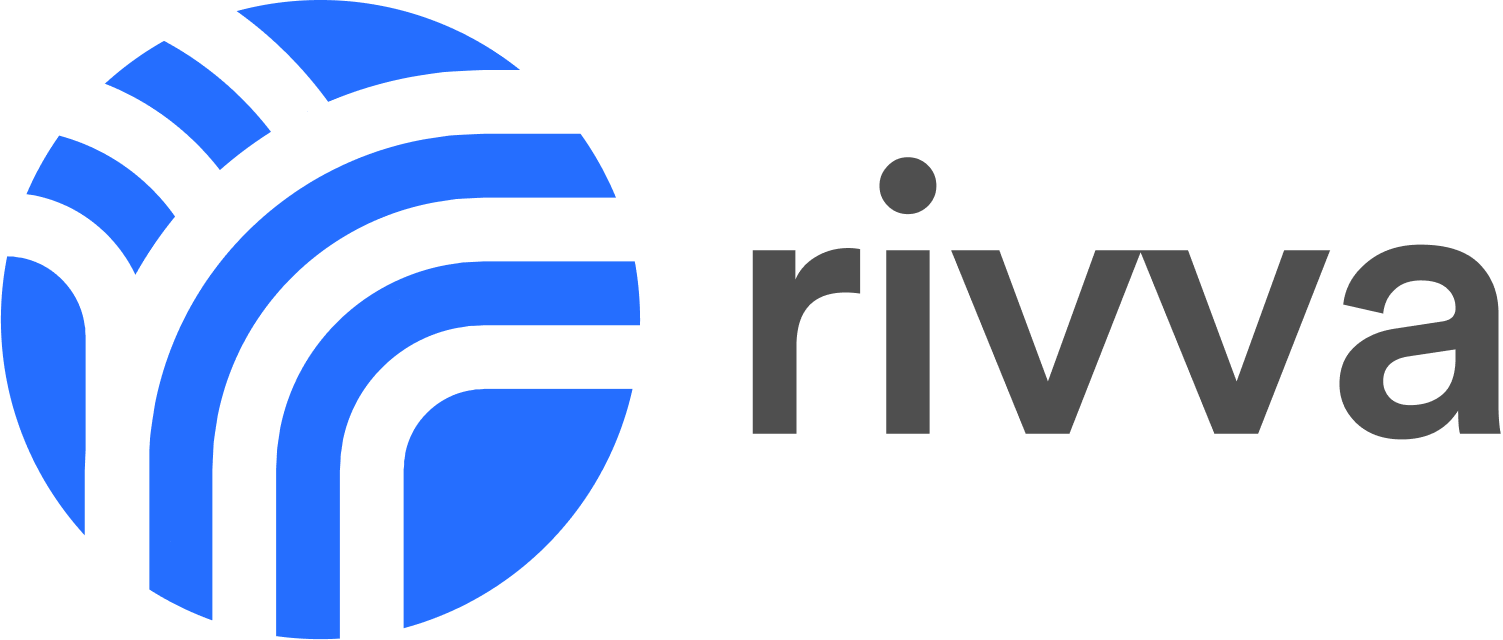The Science of Recovery: Why Breaks Aren’t Optional for Productivity
Learn why breaks aren’t optional for productivity and wellbeing. Explore the science behind microbreaks, recovery practices, and how Rivva helps you create a smarter, more sustainable workday. - The Science of Recovery at Work: Microbreaks, Brain Health & Productivity.

When was the last time you worked a full day without pausing for a true break? In today’s “always-on” work culture, pushing through back-to-back meetings, deadlines, and endless to-do lists has become the norm.
However, the reality is that sustained productivity and peak performance require intentional recovery. Scientific research consistently shows that breaks are not optional—they are essential for maintaining brain health, managing energy, and achieving sustainable work output.
In this section, we explore the science of recovery at work, the benefits of microbreaks, and best practices for incorporating recovery into your daily routine.
Why Recovery Matters: The Neuroscience Behind Work and Rest
Most of us think of productivity as a matter of willpower—sit at your desk, focus hard, and results will follow. However, beneath the surface, our brains are engaged in a complex interplay of neural activity, energy utilisation, and chemical regulation. When you focus deeply on a task, your prefrontal cortex—responsible for decision-making, attention, and creative problem-solving—becomes highly active. Over time, these neural circuits begin to fatigue, just as muscles do during intense physical activity.
Research from neuroscientists like Dr. Andrew Huberman and National Institutes of Health a metabolic cost. Without breaks, your brain’s efficiency declines, leading to more mistakes, slower thinking, and diminished creativity. Chronic overwork without adequate recovery can also elevate cortisol, the stress hormone, which in turn impacts your mood, memory, and even your long-term physical health.
Microbreaks: The Most Effective Tool for Brain Recovery
One of the most actionable insights from productivity science is the concept of the microbreak. Unlike a traditional lunch break or coffee run, microbreaks are short, frequent pauses—ranging from 30 seconds to five minutes—that are strategically timed throughout your day.

During a microbreak, you might:
- Stand and stretch for a minute
- Walk around your space
- Practice a few deep, mindful breaths
- Look out the window at something in the distance
- Do a quick gratitude or reflection exercise
Why are microbreaks so powerful? According to research published in The Journal of Applied Psychology, even very brief interruptions from cognitive work allow the brain to reset. These pauses help clear working memory, reduce physical discomfort, and replenish attention. A well-timed microbreak can be the difference between powering through your afternoon with clarity—or slogging through brain fog and fatigue.
The Pomodoro Technique is one popular method that leverages microbreaks. It involves working in focused intervals (often 25 minutes), followed by a 3-5 minute break. After four “Pomodoros,” a longer rest is taken. This system is effective because it mirrors your brain’s natural ultradian rhythms—roughly 90-minute cycles of peak alertness followed by a dip, which are well-documented in chronobiology research.
Best Recovery Practices: How to Take Breaks That Actually Work
Not all breaks are created equal. To maximize your energy and focus, consider these evidence-based best practices for integrating recovery into your day:
1. Plan Breaks in Advance
Don’t wait until you’re exhausted. Instead, proactively schedule short breaks every 45-90 minutes, based on your natural energy cycles. Use tools like Rivva to block off recovery time and remind you when to step away.
2. Move Your Body
Physical movement increases blood flow to the brain, lifts mood, and counteracts the stiffness of sitting. Even a 1-2 minute stretch, walk, or simple desk exercise can reduce discomfort and help restore mental clarity. The Mayo Clinic recommends standing and moving regularly to reduce health risks associated with prolonged sitting.
3. Change Your Environment
Stepping away from your computer, changing rooms, or even shifting your gaze to something outside can help your brain “reset” more effectively than just scrolling your phone at your desk. Try getting some sunlight or fresh air if possible.
4. Engage in Mindful or Restorative Activities
Active recovery is more powerful than passive distraction. Instead of checking social media, try a brief mindfulness exercise, deep breathing, listening to calming music, or a short meditation. Research indicates that mindfulness breaks can significantly reduce stress and enhance focus.
5. Connect with Others
Brief social interactions, even a quick chat or shared laugh, can boost your mood and renew your sense of connection. This is particularly valuable for remote workers or those who spend long hours solo.
6. Refuel Smartly
Don’t ignore your body’s needs for water and nourishment. Hydration and balanced snacks, such as nuts, fruit, and yoghurt, can help maintain stable energy levels and support cognitive performance throughout the day.
The Cost of Skipping Breaks
What happens if you skip recovery? The evidence is stark. Over time, neglecting breaks leads to:
- Cognitive fatigue: More mistakes, slower thinking, and “mental blocks”
- Mood dips: Irritability, anxiety, or low motivation
- Lower creativity: Less likely to solve problems or generate fresh ideas
- Physical discomfort: Eye strain, headaches, back and neck pain
- Burnout: Chronic exhaustion and disengagement from work

How Rivva Supports Healthy Recovery
Modern productivity tools like Rivva are designed to make recovery effortless. By mapping your chronotype, Rivva helps you identify your natural focus peaks and suggests optimal times for breaks, focus work, and recovery. Smart reminders nudge you to pause before you reach fatigue, while integrated analytics track your energy patterns, helping you build sustainable habits over time.
Unlike static to-do lists, Rivva adapts as your schedule shifts, making sure that breaks are treated as non-negotiable elements of your daily routine—not just an afterthought.
The Takeaway: Recovery Fuels Results
If you want to protect your focus, creativity, and wellbeing, treat breaks as a core part of your work strategy—not an exception to the rule. Science shows that when you recover intentionally and regularly, you not only accomplish more, but you do so with greater ease and satisfaction.
The next time you feel the urge to push through one more task, remember: stepping away for even a minute or two could be the most productive move you make all day.
Ready to build a recovery-friendly routine that works for your brain and your goals? Join the waitlist today to take the first step toward sustainable, high-performance productivity.
FAQ: The Science of Recovery at Work
How long should a microbreak be?
A microbreak typically lasts from 30 seconds to five minutes. Taking short breaks every 45–90 minutes helps restore focus and reduces fatigue, keeping your brain and body refreshed throughout the day.
What are the best microbreak activities for recovery?
Effective microbreaks include standing and stretching, walking around, getting fresh air, practicing deep breathing, or doing a brief mindfulness exercise. Try to step away from screens and move your body whenever possible.
Can microbreaks really improve productivity?
Yes—scientific research confirms that regular microbreaks prevent mental fatigue, enhance creativity, and reduce mistakes. They also support better mood, focus, and long-term engagement with your work.
How can I build a break habit during my workday?
Use calendar reminders, the Pomodoro Technique, or productivity tools like Rivva that nudge you to take breaks at optimal times based on your personal energy patterns and chronotype.
Why are breaks and recovery important for brain health and wellbeing?
Breaks allow your brain to reset, regulate stress hormones, and maintain memory and creative thinking. Regular recovery helps prevent burnout, improves physical comfort, and supports a sustainable, high-performance work life.
What happens if I skip breaks?
Skipping breaks can lead to cognitive fatigue, more mistakes, reduced creativity, low mood, and eventually burnout. Over time, ignoring recovery needs will make it harder to perform at your best and enjoy your work.
